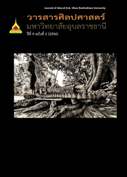การจัดการพลังงานชุมชน กรณีศึกษา ตำบลน้ำปลีก อำเภอเมือง และตำบลไม้กลอน อำเภอพนา จังหวัดอำนาจเจริญ
Main Article Content
บทคัดย่อ
งานวิจัยนี้มีวัตถุประสงค์ เพื่อ 1) ศึกษาเปรียบเทียบการใช้พลังงานในครัวเรือนของตำบลน้ำปลีก อำเภอเมือง และตำบลไม้กลอน อำเภอพนา จังหวัดอำนาจเจริญ 2) ศึกษาเปรียบเทียบปัจจัยที่มีผลต่อพฤติกรรมการใช้พลังงาน ระหว่างสองตำบล 3) ศึกษาความสัมพันธ์ระหว่างปัจจัยที่มีผลต่อพฤติกรรมการใช้ พลังงานกับการใช้พลังงานในสองตำบล 4) ศึกษาแนวทางการจัดการพลังงาน ชุมชนของทั้งสองตำบลดังกล่าว โดยทำการวิจัยเชิงปริมาณ เก็บข้อมูลด้วยแบบสอบถามจากกลุ่มตัวอย่าง 360 คน ด้วยวิธีการสุ่มแบบง่าย (Simple random sampling) สถิติที่ใช้ในการวิเคราะห์ข้อมูล คือ สถิติเชิงพรรณนา ได้แก่ ค่าความถี่ ค่าร้อยละ ค่าเฉลี่ย ค่าเบี่ยงเบนมาตรฐาน และค่าสหสัมพันธ์ของเพียร์สัน ผลการวิจัยพบว่า 1) ค่าใช้จ่ายพลังงานด้านไฟฟ้า น้ำมันเชื้อเพลิง และ ถ่าน ของทั้งสองตำบลมีความแตกต่างกัน 2) ปัจจัยที่มีผลต่อพฤติกรรมการใช้พลังงานในครัวเรือน ด้านความรู้ด้านพลังงาน ทัศนคติในการใช้พลังงาน การได้รับข้อมูลข่าวสารด้านพลังงานและทรัพยากรในท้องถิ่น ของสองตำบลมีความแตกต่างกัน (P<.05) ส่วนปัจจัยเทคโนโลยีที่ได้รับการสนับสนุนจากภาครัฐ ของสองตำบลไม่มีความแตกต่างกัน 3) ความสัมพันธ์ระหว่างปัจจัยที่มีผลต่อพฤติกรรมการใช้พลังงานกับการใช้พลังงานของสองตำบล พบว่า ในตำบลน้ำปลีกความรู้ด้านพลังงาน การได้รับข้อมูลข่าวสารด้านพลังงาน และทรัพยากรในท้องถิ่น มีความสัมพันธ์กับการใช้พลังงานถ่าน เทคโนโลยีที่ได้รับการสนับสนุนจากภาครัฐมีความสัมพันธ์กับการใช้พลังงานไฟฟ้าและการใช้พลังงานน้ำมันเชื้อเพลิง ส่วนในตำบลไม้กลอน ทัศนคติในการใช้พลังงาน มีความสัมพันธ์กับการใช้พลังงานไฟฟ้า ทรัพยากรในท้องถิ่น มีความสัมพันธ์กับการใช้พลังงานน้ำมันเชื้อเพลิง เทคโนโลยีที่ได้รับการสนับสนุนจากภาครัฐมีความสัมพันธ์กับการใช้พลังงานก๊าซหุงต้ม การใช้พลังงานน้ำมันเชื้อเพลิงการใช้พลังงานถ่าน และการใช้พลังงานฟืน 4) ส่วนแนวทางการจัดการพลังงาน รัฐควรพัฒนาองค์ความรู้ประชาชน และมีแผนการจัดการพลังงานที่เป็นระบบและสอดคล้องกับบริบทของชุมชน
Community Energy Management : A Case Study OfNampleeksubdistrict, Muang District andMaiklonsubdistrict, Phana District inAmnatcharoen Province
The research has the objectives 1) to comparatively study the household use of energy in Nam Plik Sub-district, Mueang District and Mai Klon Sub-district, Phana District, Amnat Charoen Province; 2) to comparatively study factors that influence household energy use behavior between these two Sub-districts; 3) to study the relationship between factors that influence energy use behavior and the use of energy in the two Sub-districts; and 4) to study the guideline to manage community energy. This research is a quantitative research by which a set of questionnaire was used with 360 participants by a simple random sampling. Analyzed Statistics are Frequency, Percentage, Mean, Standard Deviation, and Pearson’s correlation. The results revealed that the expenses on electricity, petrol, and charcoal of Nam Plik Sub district and MaiKlon Sub district were different. In terms of factors that influence the household use of energy, the comparative study on each aspect between the two Sub-districts showed that the factors of knowledge on energy, attitudes towards energy use, the receiving information on energy, and local energy resources were different (P<.05). In terms of the relationship between factors that influence energy use behavior and the use of energy, in Nam Plik Sub-district it is found that the knowledge of energy, the receiving information on energy, and the aspect of local energy resources correlated with the use of charcoal. The aspect of technology supported by the government correlated with the use of electricity and the use of petrol. Meanwhile, in MaiKlonSub-district, the attitudes towards the use of energy correlated with the use of electricity. The aspect of local resources correlated with the use of petrol. On the technologysupported by the government, it is found that this had thecorrelation with the use of cooking gas, the use of petrol, the use ofcharcoal, and the use of firewood. Suggestion for energymanagement is that government needs to train people to managecommunity energy. It also needs to develop a systematic energyplan that is based on the community context.


